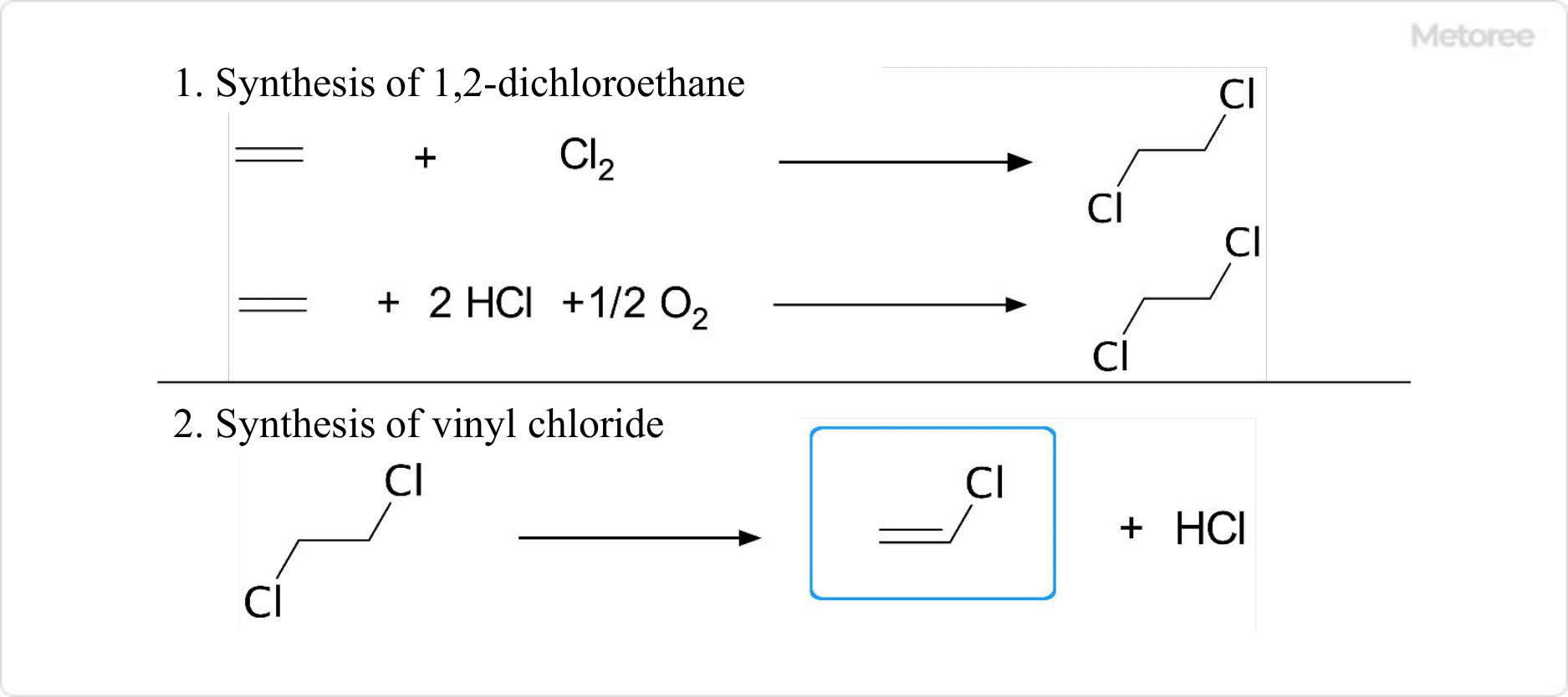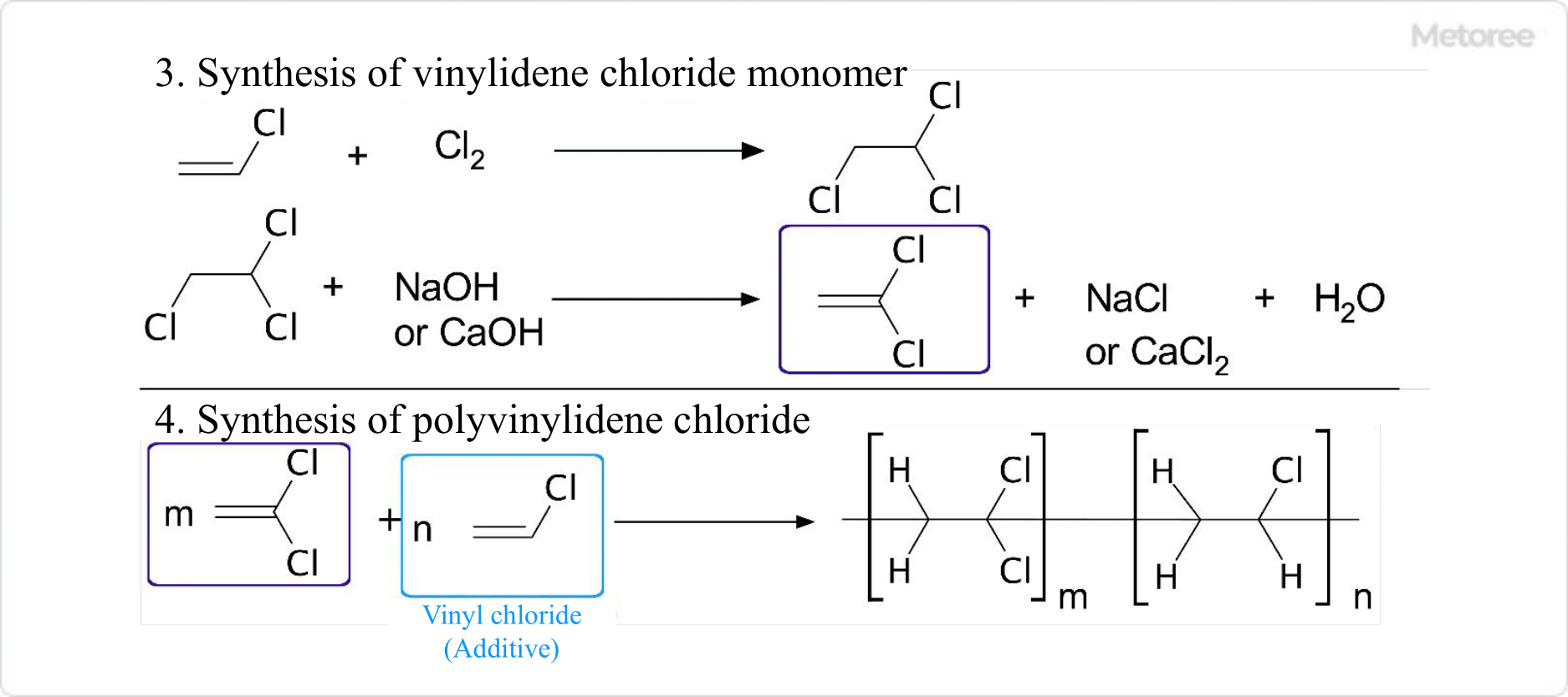All Categories
History












This section provides an overview for polyvinylidene chloride as well as their applications and principles. Also, please take a look at the list of 14 polyvinylidene chloride manufacturers and their company rankings. Here are the top-ranked polyvinylidene chloride companies as of February, 2026: 1.Wenzhou Ruiyann Industry Co., Ltd, 2.Marubeni Europe plc, 3.Solvay SA.
Table of Contents
Categories Related to Polyvinylidene Chloride
Polyvinylidene chloride (PVDC) is a synthetic resin belonging to the amorphous thermoplastic family of polymers polymerized with chlorine-containing vinylidene groups.
The structure is represented by -[CH2CCl2]n-, and the CAS number is 9002-85-1. It is a colorless, transparent synthetic resin that is supplied to the market in film or fiber form.
Compared to other sheet resins, it has superior resistance to heat, acids, and alkalis, and has low oxygen and moisture permeability, making it suitable for use in food wraps. Copolymers with vinyl chloride (PVC) or acrylonitrile are used in products on the market, and they are rarely used alone.
Polyvinylidene Chloride was originally developed primarily as a fiber. However, its most common use today is in household food wraps and to improve barrier properties from oxygen and humidity.
As a fiber, it is used today in various nets, carrier membranes for wastewater treatment, filtration cloth, and even doll's hair.
At one time, dioxin emitted during combustion became a social problem, and attempts were made to collect it separately or replace it with other components. Today, however, with the improvement of incinerator combustion temperatures, it can be handled as ordinary combustible waste.
The principle of Polyvinylidene Chloride is explained in terms of its synthesis method and properties.

Figure 2. Synthesis of Poly (vinylidene chloride) - 1
The industrial manufacturing process for Polyvinylidene Chloride is as follows:

Figure 3. Synthesis of polyvinylidene chloride - 2
Polyvinylidene Chloride is known to decompose at temperatures above 125 °C, producing hydrogen chloride.
Its moderate elasticity and its ability to provide both moisture-proofing and gas barrier properties are characteristics not found in other plastic films.
When Polyvinylidene Chloride is commercialized as a film, which is its main application, it is formed by heating, melting, cooling, and stretching. At this point, a plasticizer such as tributyl acetyl citrate is added to make the material softener. The plasticizer remains in the product and a certain amount is eluted, but it is harmless to the human body.
To enhance the heat resistance and strength of Polyvinylidene Chloride, it is sometimes sandwiched between nylon or polypropylene in the manufacturing process to create a multilayer film. This method is used not only for film products but also for manufacturing latex and fishing nets.
Today's main Polyvinylidene Chloride products include films and synthetic fibers. Film products are mainly used in household wraps and commercial food packaging materials. Synthetic fibers are often processed into products such as dust filters, filter cloths, nets for fishing, fishing lines, and blinds.
They are also sold as chemical materials intended for industrial applications, etc., and are available in powder, film, and other types. Film products are available in thicknesses of 0.0125mm, 0.033mm, 0.043mm, and in coil or square shapes.
For industrial use, the products are also supplied as waterborne high-barrier resin dispersions for coating textiles, paper, and other materials.
*Including some distributors, etc.
Sort by Features
Sort by Area

PVA TePla, founded in Corona, Ca, in 1991 is a manufacturer of systems for hard-metal sintering and crystal growing as well as the use of plasma systems for surface activation, and functionalization. The company's product portfolio includes RF Plasma Systems, Microwave Plasma Systems, Atmospheric Plasma, Wafer Inspection & Software and Metrology Systems. The company serves markets including Automotive and Electric Vehicles, Renewable Energy and Energy Storage and Electronics and IT Infrastructure.

Shanghai Metal Corporation, established in 1980 as a state-owned Shanghai Metal Materials Company headquartered in Shanghai, China, is a manufacturer and supplier specializing in metal materials and products. The company's metal offerings include aluminum, copper, stainless steel, galvanized steel, and steel products. It also provides metal machines for forming, cutting, bending, and processing. Additionally, the company offers various containers, gas cylinders, fire extinguishers, mechanical products, and electrical systems. These products find applications in various industries, such as automobile, construction and decoration, electrical and transformer components, machinery, and packaging. Other applications include oil, gas, and water pipelines, as well as boilers and tanks.

Asahi Kasei Corporation, founded in 1931 and headquartered in Tokyo, Japan, is a manufacturer specializing in chemicals and materials science. Its diverse product portfolio spans various industries, including polystyrene and Saran Wrap plastics, acrylonitrile for acrylic fiber production, construction materials, medical devices, and electronics. The company has a history of notable recognition, receiving The Nobel Prize in Chemistry in 2019 for the development of lithium-ion batteries. Its products plays a pivotal role in advancing materials and technologies across multiple sectors, contributing in plastics, healthcare, construction, and electronics.

Millipore Sigma, formerly known as Sigma-Aldrich, was created in 175 through the merger of Sigma Chemical Company and Aldrich Chemical company and today is a subsidiary of Merck. Millipore Sigma is a life science and biotechnology company serving the industry with several products and services. Some of their product categories include peptide synthesis materials, biochemicals, building blocks, catalysts, chemical biology, chemical synthesis, flavors & fragrances, formulation, lab chemicals, lab safety, APIs, and stable isotopes. Services include characterization, contract manufacturing, custom products, software, support, testing, and mRNA development & manufacturing.

Fengchen Group Co., LTD is based in Qingdao, China. The company is a manufacturer and supplier of speciality chemicals for several industries around the world including natural resources, hydrogeology, drilling, geophysics, and environmental & geotechnical services. The company’s chemical product categories include APIs, amino acids, micronutrients, package materials, and enzymes. The company also offers services including specialized transportation, samples of compounds, shipping documents needed for pharmaceutical products, and international customs support.

Alfa Chemical Co., Ltd., founded in 1973 and headquartered in Zhengzhou, India, is a manufacturer and supplier of organic chemicals for researching, development and manufacturing. The company provides scientific analytical chemicals, material science and life science chemicals, and catalysts from grams to kilograms. These chemicals include building blocks, reagents, pharmaceutical intermediates, dyes & indicators, produced by standards and analytical methods such as NMR, HPLC and MS. The company has a production facility, test laboratories and research centers, and provides packaging and delivery services.

BOC Sciences is headquartered in Shirley, New York as a brand of BOCSCI Inc. The company is a developer, manufacturer, marketer, and distributor of premium chemicals, emphasizing small molecule synthesis, biosynthesis, purification, and characterization used in academia, pharmaceuticals, biotech, CDMO, material sciences, and agriculture industries, supporting research and production. The company’s products include thousands of inhibitors, nucleotides, metabolites, and isotope-labeled products. The company offers custom synthesis and manufacturing, analytical services, antibody-drug conjugate development, and strain engineering and fermentation services.




Solvay was born in 1863 and is headquartered in Brussels, Belgium. The company is a producer of advanced materials and specialty chemicals to customers worldwide in several markets including the automotive, healthcare, aerospace, and electronics markets. The company’s product offerings range from amines to surfactants with kitting options available for certain materials such as film and tape process materials. The company sources many materials from renewable sources. The company’s cellulose acetate is produced from bio-sourced wood pulp from sustainably managed forests.


Swicofil AG, founded in 1995 and headquartered in Emmenbrücke, Switzerland, is a supplier of specialty yarns and fibers. The company specializes in providing materials for industries such as textiles, automotive, and medical. The company’s product range includes various specialty yarns, fibers, and filaments tailored to meet specific application requirements. Its materials are utilized in diverse applications, including apparel, technical textiles, and industrial applications. The company is ISO 9001 certified, ensuring quality management systems. The company is also a member of the Chamber of Commerce Lucerne.

Qingdao Kingchuan Packaging, founded in Qingdao, Shandong Province in 1992 is a supplier of plastic films such as Bopp films and Bopet film, and PVDC coatings. The company's product portfolio includes polyethylene films, polypropylene films, Polyester Films, PVC films and UV-resistant films. Their products find application in packing food items, automotive interiors, labels, and lamination applications. The company serves markets including Medical and Healthcare, Aerospace and Defense, Consumer Goods, Industrial Manufacturing and Construction and Building.
Ranking as of February 2026
Derivation Method| Rank | Company | Click Share |
|---|---|---|
| 1 | Wenzhou Ruiyann Industry Co., Ltd |
20.8%
|
| 2 | Marubeni Europe plc |
11.5%
|
| 3 | Solvay SA |
10.9%
|
| 4 | Shanghai Metal Corporation |
8.7%
|
| 5 | PVA TePla |
8.4%
|
| 6 | Alfa Chemical Co., Ltd. |
8.1%
|
| 7 | MilliporeSigma |
6.5%
|
| 8 | Fengchen Group Co.,Ltd |
6.2%
|
| 9 | Asahi Kasei Corporation. |
5.0%
|
| 10 | BOC Sciences |
4.3%
|
Derivation Method
The ranking is calculated based on the click share within the polyvinylidene chloride page as of February 2026. Click share is defined as the total number of clicks for all companies during the period divided by the number of clicks for each company.Number of Employees
Newly Established Company
Company with a History
*Including some distributors, etc.
| Country | Number of Companies | Share (%) |
|---|---|---|
 China
China
|
4 | 40.0% |
 Germany
Germany
|
1 | 10.0% |
 Japan
Japan
|
1 | 10.0% |
 India
India
|
1 | 10.0% |
 United Kingdom
United Kingdom
|
1 | 10.0% |
 Belgium
Belgium
|
1 | 10.0% |
 Switzerland
Switzerland
|
1 | 10.0% |
11 products found
11 products
Kojin Film & Chemicals Co., Ltd.
340+ people viewing
Converting film is a film that is made by laminating materials with different properties to achieve the desired performance. Kojin provides nylon f...